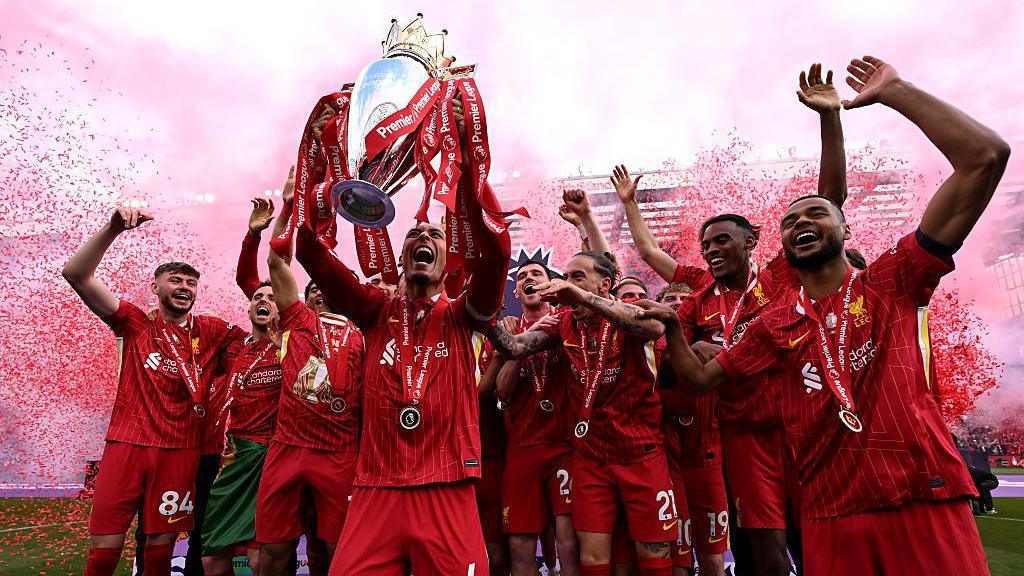Football and other premium TV being pirated at 'industrial scale'

Liverpool won the English Premier League this season, and live football is the focus on many illegal streams
- Published
A lack of action by big tech firms is enabling the "industrial scale theft" of premium video services, especially live sport, a new report says.
The research by Enders Analysis, external accuses Amazon, Google, Meta and Microsoft of "ambivalence and inertia" over a problem it says costs broadcasters revenue and puts users at an increased risk of cyber-crime.
Gareth Sutcliffe and Ollie Meir, who authored the research, described the Amazon Fire Stick - which they argue is the device many people use to access illegal streams - as "a piracy enabler".
Amazon told BBC News that it remained "vigilant in our efforts to combat piracy".
The piracy problem
Sports broadcasting is big business, with the total value of media rights across the world passing the $60bn (£44bn) mark last year.
The increasing cost of rights deals results in higher prices for fans at home, especially if they choose to pay for multiple services to watch their team play.
To get round this, some resort to illegal streams of big events.
Enders say there are often multiple streams of individual events - such as high profile football games - each of which can have tens of thousands of people watching them.
Bosses of big rights holders, Sky and DAZN, have previously warned piracy is causing a financial crisis in the broadcast industry, external.
Nick Herm, chief operating officer of Sky Group, said the Enders research "highlights the significant scale and impact of piracy, particularly on premium live sport".
"It's a serious issue for anyone who invests in creating and delivering world-class content," he added.
"We'd like to see faster, more joined-up action from major tech platforms and government to address the problem and help protect the UK creative industries."
There is a risk for users too.
The Enders report says fans watching football matches, for instance, via illegal streams are typically providing information such as credit card details and email addresses, leaving them vulnerable to malware and phishing scams.
Many supporters, though, argue that lowering the cost of legally streaming sport would be the most effective way of minimising such risks.
Fire Stick in the firing line
The researchers looked at the European market and focussed on Amazon, Google, Meta and Microsoft.
While Meta, the owner of Facebook, was criticised for being the source of adverts for illegal streams, the technology of the other three was blamed for the increase in piracy.
The Amazon Fire Stick is a major cause of the problem, according to the report.
The device plugs into TVs and gives the viewer thousands of options to watch programmes from legitimate services including the BBC iPlayer and Netflix.
They are also being used to access illegal streams, particularly of live sport.
In November last year, a Liverpool man who sold Fire Stick devices he reconfigured to allow people to illegally stream Premier League football matches was jailed.
After uploading the unauthorised services on the Amazon product, he advertised them on Facebook.
Another man from Liverpool was given a two-year suspended sentence last year after modifying fire sticks and selling them on Facebook and WhatsApp.
According to data for the first quarter of this year, provided to Enders by Sky, 59% of people in UK who said they had watched pirated material in the last year while using a physical device said they had used a Amazon fire product.
The Enders report says the fire stick enables "billions of dollars in piracy" overall.
A spokesperson from Amazon, who are sports rights holders themselves, told BBC News: "Pirated content violates our policies regarding intellectual property rights, and compromises the security and privacy of our customers."
They said Amazon worked hard to protect customers from the risks associated with pirated content, and warned customers about installing or using apps from "unknown sources".
Amazon has also made changes to its Fire devices to make it harder for people to stream pirated content, they added.
Meta has made no comment.
Depreciation of tech allows piracy to flourish

The researchers also pointed to the role played by the "continued depreciation" of Digital Rights Management (DRM) systems, particularly those from Google and Microsoft.
This technology enables high quality streaming of premium content to devices. Two of the big players are Microsoft's PlayReady and Google's Widevine.
The authors argue the architecture of the DRM is largely unchanged, and due to a lack of maintenance by the big tech companies, PlayReady and Widevine "are now compromised across various security levels".
Mr Sutcliffe and Mr Meir said this has had "a seismic impact across the industry, and ultimately given piracy the upper hand by enabling theft of the highest quality content".
They added: "Over twenty years since launch, the DRM solutions provided by Google and Microsoft are in steep decline.
"A complete overhaul of the technology architecture, licensing, and support model is needed. Lack of engagement with content owners indicates this a low priority."
Google has highlighted a number of measures, external it does to protect content, stating that it takes "the ever-evolving challenge of copyright infringement" seriously.
Microsoft has made no comment.
Man jailed for selling online access to TV football
- Published6 February 2024
TV gang illegally streamed Premier League matches
- Published30 May 2023

Sign up for our Tech Decoded newsletter to follow the world's top tech stories and trends. Outside the UK? Sign up here.